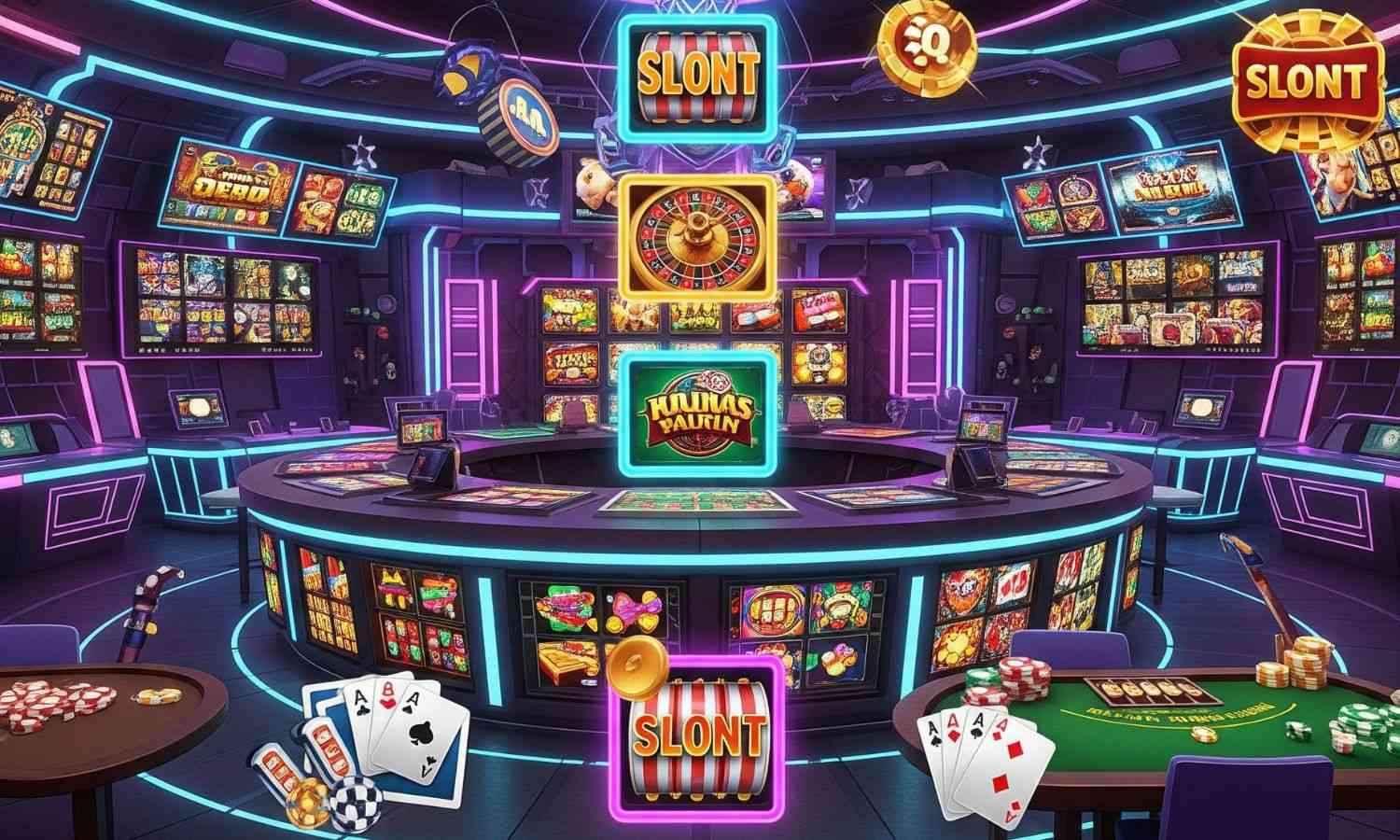The story of online casinos is deeply intertwined with the rise of the internet itself. Before the mid-1990s, gambling was largely confined to physical establishments like land-based casinos, race tracks, and lottery booths. The digital revolution, however, brought a seismic shift.
The true genesis of online gambling can be traced back to 1994 when Antigua and Barbuda passed the Free Trade & Processing Act, allowing them to grant licenses to companies offering online gambling services. This legal framework was crucial. Around the same time, Microgaming, a pioneering software company, developed the first fully functional gambling software. The first genuine online casino, InterCasino, is often cited as launching in 1996, offering a limited selection of basic casino games like blackjack and roulette. Cryptologic also played a vital role by developing secure transaction software, which built early trust among users for online financial dealings.
As internet connectivity improved and personal computers became more common, the online casino industry began to boom. More software developers entered the market, leading to an explosion in game variety. Beyond classic table games, sophisticated video slots with diverse themes, video poker, and even early versions of progressive jackpot slots (like Microgaming's "Cash Splash" in 1998) emerged, offering life-changing sums from the comfort of one's home.

A significant leap in the online casino experience came with the introduction of live dealer games. These games bridged the gap between the virtual and physical by streaming real-time casino tables with human dealers. Players could interact with dealers and other players via chat, adding a crucial social and immersive element that many felt was missing from purely digital games. The advent of smartphones and tablets dramatically reshaped the industry. Mobile compatibility became a top priority, leading to the development of dedicated casino apps and highly optimized mobile websites. This allowed players to access their favorite games on the go, anytime, anywhere, significantly expanding the market and attracting a new generation of players.
Types of Online Casino Games
Online casinos boast an incredibly diverse portfolio of games, catering to every preference and skill level. These can broadly be categorized as:
-
Slot Machines: By far the most popular category, online slots come in countless themes, designs, and variations.
-
Classic Slots: Simple, often 3-reel games resembling traditional "fruit machines."
-
Video Slots: More advanced, with 5 or more reels, intricate graphics, animations, multiple paylines, and various bonus features (free spins, mini-games, wilds, scatters).
-
Progressive Jackpot Slots: A portion of every bet placed across a network of games contributes to a rapidly growing jackpot, which can reach millions and is won by a single lucky player.
-
-
Table Games: Digital versions of classic casino games typically played at a table.
-
Blackjack: Players aim to get a hand value as close to 21 as possible without exceeding it, trying to beat the dealer.
-
Roulette: Players bet on where a ball will land on a spinning wheel, with options for specific numbers, colors (red/black), odd/even, etc. Variants include European, American, and French roulette.
-
Baccarat: A card game where players bet on the "player" hand, the "banker" hand, or a "tie," aiming for a hand value closest to nine.
-
Craps: A high-energy dice game where players bet on the outcome of one or more rolls of two dice.
-
Poker (Casino variants): Games like Casino Hold'em, Three Card Poker, and Caribbean Stud Poker where players play against the house rather than other players.
-
-
Live Dealer Games: These games stream real-time action from a casino studio, allowing players to interact with human dealers and other players. They include live versions of:
-
Live Blackjack
-
Live Roulette
-
Live Baccarat
-
Live Poker variants
-
Game Shows (e.g., Dream Catcher, Monopoly Live)
-
-
Video Poker: A hybrid of slot machines and traditional poker. Players are dealt five cards and can choose which to hold or discard to form the best possible poker hand. Popular variants include Jacks or Better, Deuces Wild, and Bonus Poker.
-
Specialty Games: A broader category for games that don't fit neatly into the above, such as:
-
Bingo: Digital versions of the popular lottery-style game.
-
Keno: A lottery-like game where players choose numbers and hope they match the drawn numbers.
-
Scratch Cards: Digital versions of instant-win scratch-off tickets.
-
Sic Bo: An ancient Chinese dice game where players bet on the outcome of three dice rolls.
-
Licensing and Regulation of Online Casinos
Licensing and regulation are the cornerstones of legitimacy and player safety in the online casino industry. A reputable online casino must hold a valid license from a recognized regulatory authority.
A classic sample for this is 77bd online casino login
-
Purpose of Licensing:
-
Ensures Legality: Allows operators to legally offer gambling services in specified jurisdictions.
-
Player Protection: Enforces strict rules to safeguard player funds, ensure fair play, and protect against fraud and exploitation.
-
Responsible Gambling: Mandates the implementation of tools and policies to promote healthy gambling habits.
-
Anti-Money Laundering (AML) & Know Your Customer (KYC): Requires operators to verify player identities and report suspicious transactions to prevent illicit activities.
-
Fairness of Games: Ensures that games use certified Random Number Generators (RNGs) to guarantee random and unbiased outcomes, often requiring independent audits.
-
-
Key Regulatory Authorities: Some of the most respected and commonly cited licensing bodies include:
-
United Kingdom Gambling Commission (UKGC): Known for its stringent regulations and strong player protection.
-
Malta Gaming Authority (MGA): A highly reputable authority in Europe, licensing many global operators.
-
Gibraltar Regulatory Authority (GRA): Another well-regarded European regulator.
-
Curacao eGaming: A more accessible license for many operators, often chosen for its flexibility.
-
Kahnawake Gaming Commission (Canada): A reputable regulator based in the Mohawk Territory of Kahnawake.
-
State-Specific Regulators (e.g., US states): In jurisdictions like various US states, individual state gaming control boards issue licenses for operations within their borders (e.g., New Jersey Division of Gaming Enforcement, Pennsylvania Gaming Control Board).
-
-
Licensing Process: Obtaining a license is a rigorous process involving extensive background checks on owners and key personnel, detailed business plans, proof of financial stability, and audits of software and security systems. Operators must demonstrate ongoing compliance to maintain their license.
-
Jurisdictional Challenges: The global nature of online gambling poses challenges, as a casino might be licensed in one country but accessible from others where it is not explicitly regulated. This highlights the importance for players to choose casinos licensed in jurisdictions known for strong oversight.
Payment Methods and Security in Online Casinos
Secure and convenient payment methods are crucial for online casinos. Operators utilize advanced security measures to protect players' financial and personal information.
-
Common Payment Methods:
-
Credit/Debit Cards: Visa, Mastercard, American Express are widely accepted. They are convenient but some banks may block gambling transactions.
-
E-Wallets: PayPal, Skrill, Neteller, MuchBetter are popular for their speed, convenience, and added layer of privacy as they act as intermediaries between your bank and the casino.
-
Bank Transfers: Direct transfers from your bank account. While secure, they can be slower for both deposits and withdrawals.
-
Prepaid Cards: Paysafecard is a common example. Players load a fixed amount onto the card, offering excellent control over spending and anonymity as no bank details are shared with the casino. However, they are typically for deposits only.
-
Cryptocurrencies: Bitcoin, Ethereum, Litecoin, etc., are gaining popularity for their anonymity, often lower transaction fees, and fast processing times. Transactions are secured by blockchain technology.
-
Mobile Payment Solutions: Apple Pay, Google Pay, and "Pay by Phone Bill" options allow for quick and convenient deposits via smartphone, often using biometric authentication.
-
-
Security Features: Reputable online casinos employ multiple layers of security to protect sensitive data:
-
SSL (Secure Socket Layer) / TLS (Transport Layer Security) Encryption: This technology encrypts all data transmitted between the player's device and the casino's servers, making it unreadable to unauthorized parties. Look for the padlock icon in the browser's address bar.
-
Firewalls: Robust firewalls protect the casino's servers from external threats and unauthorized access.
-
Random Number Generators (RNGs): All legitimate online casino games use RNGs to ensure that game outcomes are completely random and fair. These RNGs are regularly tested and certified by independent third-party auditors (e.g., eCOGRA, iTech Labs).
-
KYC (Know Your Customer) Procedures: Players are required to verify their identity with documents (ID, proof of address) before withdrawals, which helps prevent fraud and money laundering.
-
Secure Payment Gateways: Online casinos partner with reputable payment processors that adhere to strict security standards.
-
Two-Factor Authentication (2FA): Some casinos offer 2FA as an optional layer of security for player accounts.
-
Responsible Gambling Practices

Responsible gambling (also known as "safer gambling") is a critical aspect of the online casino industry, aiming to prevent and mitigate gambling-related harm. Legitimate online casinos are committed to promoting healthy gambling habits and providing tools for players to manage their play.
-
Key Principles and Tools:
-
Self-Exclusion: Allows players to voluntarily ban themselves from accessing the casino for a set period (e.g., 6 months, 1 year, or permanently).
-
Deposit Limits: Enables players to set daily, weekly, or monthly limits on how much money they can deposit.
-
Loss Limits: Allows players to set a maximum amount they are willing to lose over a specific period.
-
Session Limits / Reality Checks: Players can set time limits for their gaming sessions, with a pop-up reminder to take a break.
-
Cool-Off Periods: Shorter breaks (e.g., 24 hours, 7 days) during which players cannot access their accounts.
-
Activity Statements: Provides players with a detailed overview of their gambling activity, including deposits, withdrawals, wins, and losses, to help them track their spending.
-
Underage Gambling Prevention: Strict age verification processes are in place to prevent minors from accessing gambling sites.
-
Links to Support Organizations: Reputable casinos prominently display links to problem gambling support organizations (e.g., Gamblers Anonymous, GamCare) for those who need help.
-
Responsible Advertising: Operators are expected to adhere to ethical marketing guidelines, avoiding targeting vulnerable individuals or making unrealistic claims.
-
-
Why it Matters: Responsible gambling practices protect players from financial distress, mental health issues, and strained relationships that can arise from excessive gambling. For operators, it builds trust, enhances their reputation, ensures regulatory compliance, and contributes to the long-term sustainability of the industry.
The Pros and Cons of Playing at Online Casinos
Like any form of entertainment, online casinos come with their own set of advantages and disadvantages.
_1749365920.jpg)
Pros:
-
Convenience and Accessibility: Play from anywhere, anytime, using a desktop or mobile device. No travel time or physical casino dress codes.
-
Vast Game Variety: Online casinos typically offer thousands of games, far more than most land-based casinos, including exclusive online-only titles and a wide range of betting limits.
-
Bonuses and Promotions: Generous welcome bonuses, free spins, loyalty programs, and cashback offers are common incentives that can boost a player's bankroll and extend playtime.
-
Privacy and Anonymity: For those who prefer to gamble discreetly, online platforms offer a level of privacy not available in physical casinos. Cryptocurrency options further enhance anonymity.
-
Flexible Betting Options: Online casinos cater to all budgets, from penny slots to high-stakes VIP tables, allowing players to choose games that match their financial comfort.
-
Higher Payout Percentages (RTP): Due to lower overheads, online casinos often offer slightly higher Return to Player (RTP) percentages on games compared to land-based counterparts.
-
Learning Opportunities: Many online casinos offer free-play modes, allowing players to practice games and strategies without risking real money.
Cons:
-
Risk of Addiction and Problem Gambling: The 24/7 accessibility and ease of play can make it harder for individuals to set limits, potentially leading to compulsive gambling behaviors.
-
Lack of Social Interaction: While live dealer games offer some interaction, the overall social atmosphere of a bustling land-based casino, with its direct human interaction, is largely absent.
-
Withdrawal Delays/Issues: While reputable casinos aim for fast payouts, some players may experience delays or encounter complex verification processes when withdrawing winnings.
-
Security Concerns (for unregulated sites): While licensed casinos are secure, the existence of unregulated or rogue sites poses a risk of fraud, unfair games, and data breaches. It's crucial to play only at licensed and reputable sites.
-
Financial Discipline Required: The ease of making deposits can sometimes lead to overspending if players do not practice strict bankroll management.
-
Technical Glitches: Although rare with well-maintained platforms, technical issues or internet connectivity problems can interrupt gameplay.
The 21st century has seen online casinos adopt cutting-edge technologies. Blockchain and cryptocurrencies like Bitcoin gained traction as payment methods, offering enhanced anonymity and security through decentralized ledgers. Some casinos even operate entirely on blockchain technology, ensuring transparency. Artificial intelligence is also being used to monitor gambling patterns and enhance responsible gambling efforts. Virtual Reality (VR) and Augmented Reality (AR) are emerging frontiers, promising even more immersive experiences in the future.























